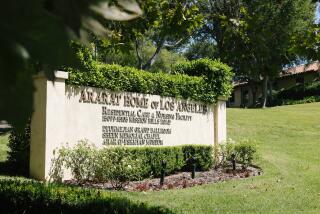Making ‘Death With Dignity’ Reality
The contrast is dramatic yet revealing. The stories are both heartbreaking and heartwarming. A nursing home in the San Fernando Valley is on the brink of economic disaster, with others soon to follow, due to alleged mismanagement and misappropriation of funds.
A few miles away, a young nurse calls tender loving care of terminally ill elders her “calling.” One can only be in awe of one so young possessing such empathy for those on death’s doorstep.
These contrasting stories appeared in the newspaper only days apart and highlight the real problem facing society when it comes to the oldest among us. Do we really care what happens to those at the end of life’s journey? Is “dying with dignity” a goal of public policy or just a warm and fuzzy ideal spoken of by opportunistic politicians?
When litigating elder abuse cases against nursing homes, I have seen the worst of the worst. Horrible bedsores because a minimum-wage nurse assistant could not be bothered to turn her patient a minimum of every two hours. Rapid dehydration and deterioration because a licensed vocational nurse would rather not make a fourth call to an attending physician who visits the nursing home only every 30 days and dreads even those occasions.
No one is surprised at such horror stories. At the other end of the spectrum, it is not unfair to say that the hospice nurse was the subject of a newspaper article because her compassion seemed out of the ordinary.
The sad truth is that we are a nation that does not really care about its elderly. More than once, social scientists have reminded us that in other countries, especially Japan, the elderly are held in highest esteem, rewarded by attention and care. There is no such priority in this country.
The statistics are staggering. The elderly are the fastest growing age group in the United States. In just three years, people older than 65 will represent more than 13% of the U.S. population. By 2030, the elderly will represent 22% of the population. They will number about 66 million, more than the number of children.
There are more than 1 million incidents of elder abuse reported in this country each year, yet government prosecutors handling elder abuse cases estimate that only one in 14 cases is ever reported.
Although medical science is certainly responsible for pushing the envelope of life expectancy, the price for many has been more years at risk for abuse and exploitation. Alzheimer’s disease and other mental disorders affect one of 10 elders. Elderly people are hospitalized more frequently than the general population, for longer periods and require twice as much prescription medication. With advancing age comes the inevitable inability to perform at least one daily task of living. These people are vulnerable and with vulnerability comes abuse.
Elder abuse occurs because the abuser’s target is helpless, unable to fight back and, in the case of financial abuse, trusting of the abuser, usually a family member. With abuse and neglect in a nursing home or board and care facility, the predominant themes are inadequate staffing, poor training and daily pressures that sap even the most well-meaning nurse of motivation.
Whether they be family members or health-care workers, our society is ill-equipped to deal with such human breakdown. We are uncomfortable with incontinence. We turn away from skin breakdown, bedsores and infection. We would rather not visit our formerly vibrant mother who now does not recognize us as she lies in a nursing home bed.
The problem is not lack of legal protection. There are pages and pages of regulations. Every aspect of nursing home operation is regulated by government. But no law can force a nurse assistant to care. No law can compel convalescent home owners to properly manage their facilities. No law can compel a doctor to provide quality attention. Most critically, laws are worthless unless they are enforced.
As we close out this century, policymakers cannot hold enough press conferences to trumpet the latest bill dealing with the education and protection of children. “Our children are our future” is an obvious truism. But at the same time, we cannot ignore the stark numbers we face in the next century when it comes to the elderly and infirm.
The battle against elder abuse must be taken seriously by policymakers at the federal and state level. We must adequately fund the federal Health Care Financing Administration and the state Department of Health Services, then demand that they vigorously apply the laws and regulations at their disposal. As things stand now, the disciplinary system for nursing homes is woefully inadequate. Elected representatives must follow the lead of those such as Sen. Charles E. Grassley (R-Iowa) who wonder why only a fraction of nursing homes found to have serious deficiencies are fined or otherwise disciplined. Organizations such as the California Assn. of Health Facilities and the California Medical Assn. have for too long paid lip service to reform in enforcement priority; they need to start paying attention to the outrage that is elder abuse, and not just lobby against every consumer protection bill they see.
We must start now to educate ourselves and our children, the future nurses and doctors of this country, about aging, death and dignity. We must begin the long process of transforming ourselves into a society that wants to promote pride and dignity as our people age and lose their physical and mental abilities, despite the commitment such care requires. Do we want to reorder our priorities in this manner? If we do not, then “death with dignity” will be an empty promise.
More to Read
Sign up for Essential California
The most important California stories and recommendations in your inbox every morning.
You may occasionally receive promotional content from the Los Angeles Times.










